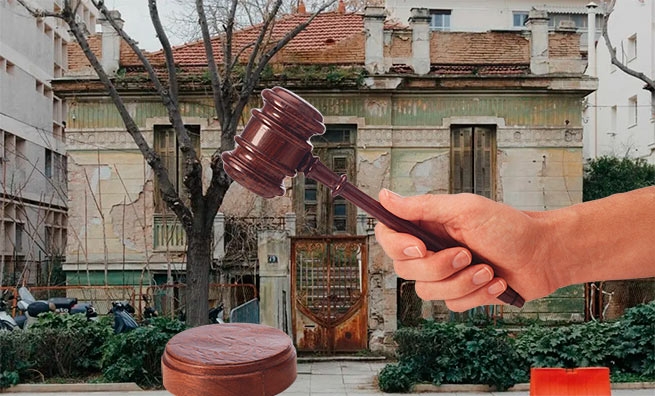“When you see property in poor condition or unused, think about the fact that it is most often property that is owned by a large group of people.”
Michalis Hadjifotis, an Athenian real estate lawyer, explains that behind the closed shutters of dilapidated houses, thousands of which are located in various places in Greece, including in urban centers, stories of family conflicts often hide.
“Disagreements between the co-owners of real estate lie, on the one hand, in how it is used – operated, and on the other – in the costs of maintenance, repair or reconstruction, which are usually the biggest headache. If the property is inherited by at least two persons, who cannot – for financial or personal reasons – agree among themselves, it becomes impossible to decide on her future,” he explains.
Property auction for revenge
In such cases, courtrooms are a one-way street. Based on legal experience, it is usually either cases of compensation for the costs of maintaining and repairing the property, or disputes between co-owners about the results of property management (for example, whether the management was correct or whether money was correctly withheld from the rent of the property for maintenance costs) . Going to court in such cases, although time-consuming and costly, is ultimately the only solution, because, in addition to the financial aspect, there is also the desire for moral satisfaction, which usually affects close relatives.
“Going to court is sometimes the only solution”
“I can recall a case of a ‘fierce’ legal dispute between two brothers: one of them permanently resided abroad and demanded compensation for the use of a small vacation home, which was used exclusively by his brother. His goal was to put the property up for auction in revenge,” – recalls Michalis Hadjifotis.
“Anyone who dares to seek justice loses sleep”
Typical are the adventures of a Greek businesswoman permanently residing abroad, who over the past 5 years has been trying to resolve a number of disputes in court with a relative over an apartment of 75 sq.m. in the southern suburbs. “My cousin and I inherited my aunt’s apartment in 1990. Since I live and work abroad, we decided that my sister, who lives in Greece, would take over the management of it. It goes without saying that before the renovation, she had to get my consent and provide valid evidence that the work was done, since I could not verify that they were really done,” says L.V.
“However, she withheld from me amounts for which she either did not have receipts, or the receipts presented were unacceptable. have not been implemented,” she adds.
Delay in Greek courts and non-pecuniary damage
The co-owner of a small apartment in Nea Smyrni speaks of the mental breakdown she has suffered in recent years due to a protracted dispute with her cousin, which she says is due to “serious delays in the Greek courts.” It is impossible to describe the suffering of the injured party seeking justice under the current legislation. Anyone who decides to do this loses sleep for many years, stress affects his health, and, in addition, the financial costs are unbearable. However, it is about restoring justice.
As a result of the litigation, the apartment has not been rented out for the past two and a half years due to its deplorable state, as the co-owner now refuses to share in the cost of repairs.
“He offered to buy his share at the price of its market value. I agreed, although I knew that its market value was much lower. But when we began the procedure for transferring the share, at the last moment he added a condition for me to withdraw the lawsuit filed in 2018 against amounts he withheld from me for repair costs I refused and in October 2022 he handed over his share to his lawyer – not only at a lower price than he offered me, but without notifying me or giving me the opportunity to purchase it as a co-owner at this price, as co-owners in other states are required to do through the “first refusal” procedure.
In Greece, there are no such procedures that give mandatory priority to co-owners to buy the share of others, Hatzifotis specifies. “The owner of a percentage of the property cannot be obliged to transfer the property to another owner, nor can he be obliged to buy a share of another. Similarly, there is no possibility of preference in favor of other co-owners if one of them wants to transfer his share. In all these cases the law provides for the only way to solve the problem by force – a trial, with all the ensuing costs of time and money, in urban centers.
Long-term or short-term lease disputes
Courtrooms are also the place where those who do not agree on how to administer the property they jointly own find themselves. What happens, for example, if one owner wants to transfer it to a long-term lease, and the other – to a short-term one? “The decision on how to operate the property is made by the majority of owners, depending on the size of their shares,” emphasizes Hatzifotis. “If the method of management and use has not been determined by a general agreement or by a majority, then each of the owners has the right to go to court to resolve this issue in the most appropriate way.”
Bureaucracy and costs hinder property development
Even if all owners decide to sell their property – either because they cannot agree on its use or because they are unable to maintain it – a series of bureaucratic and costly procedures often act as a deterrent to selling it.
“Drawing up a property transfer agreement with a notary has become more and more difficult over the years,” says Hatzifotis. obligations to pay property tax, as the case may be, etc.” For example, a certificate of the forest or non-forest nature of the property, if it is an off-plan property, or an amendment to the act of creating a divided property, if it is a divided property. He adds that the process of drafting a contract for the sale of real estate is gradually becoming more like an environmental permit process than a civil law contract.
“In this context, it is very common for the owners of small shares of property to be completely indifferent to the fate of their real estate, since as a result it is unprofitable to deal with them,” he concludes.
PS There is another reason why such a property is in a deplorable state, or what lawyers do not talk about – the money spent on perennial courts and lawyersoften literally empty the wallets of the disputants, driving them into debt, as a result of which the parties do not even have money left to somehow put the real estate objects in order.







More Stories
AADE: What you need to know about the heating allowance credited to your energy bills
The war casts a heavy shadow on the global economy
Greek KLEEMANN elevators are supplied to hundreds of countries around the world